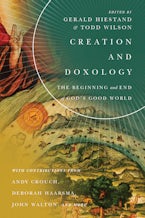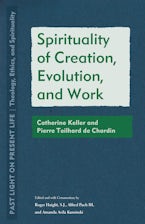- Home
- Center for Pastor Theologians
- religion
- science
- Creation and Doxology

Creation and Doxology
The Beginning and End of God's Good World
Edited by: Gerald L. Hiestand and Todd Wilson
Series: Center for Pastor Theologians
224 Pages
- Paperback
- ISBN: 9780830853861
- Published By: IVP Academic Press
- Published: October 2018
$25.00
As the title suggests—Creation and Doxology: the Beginning and End of God’s Good World—this is an ambitious book with a cosmic focus. This collection of essays does, indeed, span the biblical narrative, from the question of origins in Genesis 1-3 to the presence of the triune God in the New Jerusalem. This edited volume is fascinatingly conceived, with a wide range of contributions, and grows out of a conference (with the same title) hosted by the Center for Pastor Theologians. The text is not only interested in the doctrines of creation and eschatology, but also touches on a little of everything in between: Hebrew festivals, galaxies, historical Adam, sacraments, the devil, science and apologetics, medicine and technology, theological anthropology, and pastoral leadership.
One of the goals of this book is to advance an intellectually and academically rigorous debate that bridges the academy and the church. It seeks to equip pastors to teach on these highly divisive topics as well as to include them as contributing voices in the conversation. Moreover, the authors undertake this project in a spirit of “intellectual hospitality,” which, in Gregory Waybright’s words, “means we are desirous of considering an alternative position and also of challenging it” (211). Editors Gerald Hiestand and Todd Wilson achieve their goal admirably, and the book does exemplify how Christian scholars and pastors can teach and defend the Christian faith in a manner that is, at once, “irenic and engaging” (4).
The editors recognize that the various chapters of the book are quite disparate, and without some careful coordination, the volume could easily come across as disjointed and ineffective; however, they bring order to the chaos both schematically and theologically. Schematically, the book is divided in three subcategories, each with four chapters: Creation Expressed, Creation Explored, and Creation Practiced. Whether or not these subcategories were part of the original conference, or employed later by Hiestand and Wilson, they help to organize the chapters around more manageable themes that give the book a helpful framework, and the theses for most of the chapters align roughly with expressing, exploring, or practicing. Furthermore, these subcategories thoughtfully offer a subtle movement within the book from discovery, to investigation, and on to embodiment.
The second organizing thread is the book’s theological premise. Creation and Doxology is far richer than just a collection of essays on different facets of creation; rather, the Christian doctrine of creation is, at once, a source of and a reason for praise and thanksgiving directed solely to the triune Creator. All of the authors are cognizant of the broken relationships permeating the created order: broken relationships with God, with each other, and with nature. For example, along with the exuberant and overabundant plenitude that 20th century science has discovered in the cosmos, Andy Crouch calls Christians to attend to the vastness, decay, and predation woven throughout the universe. Hiestand uses Irenaeus’s theology of the devil to counter Platonic, Stoic, and Gnostic philosophies of materiality, and in turn, to provide a biblical soteriology that “necessarily climaxes with the defeat of the devil and the terrestrial enthronement of humanity” (115). Paige Comstock Cunningham urges the church to pursue biblical wisdom—learned from Genesis—as it seeks to counter the idolatrous and dehumanizing uses of technology in the “MedTech Age” that tempt us to deny our contingent reality as creatures. In short, and despite this brokenness, the Christian doctrine of creation exudes eschatological hope: “the essays in this book seek explicitly to establish and celebrate the native connection between creation and doxology, between the beautiful things that have been made and the Beautiful One himself, between the created things and the Creator God who gave them” (3).
Another strength of the book is the diversity of its contributors: pastors, theologians, biblical scholars, educators, and scientists. I cannot do justice to each of the twelve chapters in this volume, but rest assured, each chapter makes a thoughtful, strong, and well-documented contribution to the book. Here, I can only mention briefly particular points of interest, but readers interested in this topic will glean many more insights than these alone.
Deborah B. Haarsma provides a strong apologia for the harmony between the Christian worldview and our modern scientific endeavors. She rebuts a philosophically faulty “scientism” and argues that “a scientific explanation does not replace God. Rather, it shows us more of God’s works” (25). Especially helpful is her well-footnoted discussion of God’s use of a “mediated creation,” not solely in the formation of the universe, but (more critically today) in the process of evolution. John H. Walton provocatively and powerfully argues against identifying the missio dei in scripture through the hermeneutic of a redemptive metanarrative, which he considers secondary, in favor of the mission of God rooted in creation. Walton advances an “Immanuel Theology” that discerns the “recurrent theme” of divine “presence” among God’s people (137). Walton is motivated by issues of methodology, hermeneutical control, biblical authority, and authorial intent, and while I get the impression that I am entering mid-stream into a larger conversation, I am nevertheless sorely tempted to reorder my introductory Bible classes around the theme of God’s presence that Walton traces throughout the canon.
One drawback of the book is that it is heavily steeped in the evangelical Reformed tradition, and I sometimes felt like a visitor to a long-standing intra-ecclesial debate, especially when inerrancy cast its large shadow over the interpretation of Genesis 1-3, and the question of origins. I mostly agree with Wilson’s “Mere Christianity”—given that this is his goal, he would be pleased—and I appreciate the cautiousness with which he continues to affirm the historicity of Adam and Eve and the Fall. Were they created de novo, and was Eden, then, also a real place? Does the doctrine of soteriology really “hinge” on Adam and Eve being real people, and would it really “unravel” if they were not? Must the Fall recount an historical event (52)? Commensurately, what would happen to the doctrine of inerrancy if St. Paul taught that Adam and Eve were real people, if in fact they were not? Hans Madueme wrestles with these issues as well, and whereas Haarsma and Crouch flatly assert an old universe, Madueme confusingly attempts to argue for young-earth creationism. Madueme does believe in heliocentrism, but not an old universe. He asserts that there are “empirically rooted reasons” for doubting the scientific consensus where “it conflicts with Scripture, even if I have no idea what those reasons are.” The trouble is that scientific truth never conflicts with scripture, just one’s interpretation of it. He believes there are Christian models of the universe that are more “plausible” than the “overwhelming consensus,” even though he does not have them (69-70). And his assertion that we process data from scripture differently than we do data from our observation of the world requires a much stronger defense (73).
In all, Creation and Doxology is an excellent resource that can be used profitably by pastors and seminary students alike. In fact, I would like to encourage the editors and IVP to consider an ecumenical sequel by inviting Catholics, Orthodox, Wesleyans, Pentecostals, and others to continue this engaging conversation.
Stephen Sours is Associate Professor of Religion at Huntingdon College.
Stephen SoursDate Of Review:June 21, 2019
Gerald L. Hiestand is Interim Senior Pastor at Calvary Memorial Church in Oak Park, Illinois, and the Cofounder and Director of the Center for Pastor Theologians.
Todd Wilson is President and Cofounder of the Center for Pastor Theologians and the former senior pastor of Calvary Memorial Church in Oak Park, Illinois.











